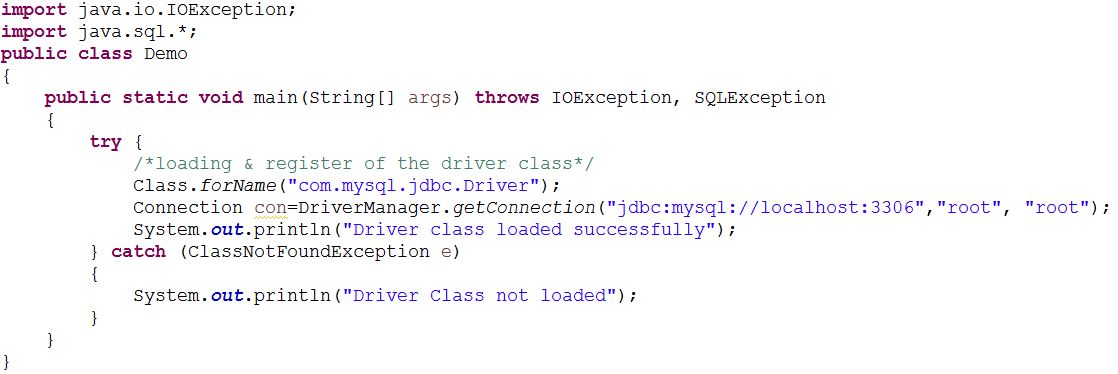Introduction to Hibernate Framework
Last Updated : 08 Jun, 2022
Prerequisite : JDBC Need of Hibernate Framework
Hibernate is used to overcome the limitations of JDBC like:
- JDBC code is dependent upon the Database software being used i.e. our persistence logic is dependent, because of using JDBC. Here we are inserting a record into Employee table but our query is Database software-dependent i.e. Here we are using MySQL. But if we change our Database then this query won't work.

- If working with JDBC, changing of Database in middle of the project is very costly.
- JDBC code is not portable code across the multiple database software.
- In JDBC, Exception handling is mandatory. Here We can see that we are handling lots of Exception for connection.

- While working with JDBC, There is no support Object-level relationship.
- In JDBC, there occurs a Boilerplate problem i.e. For each and every project we have to write the below code. That increases the code length and reduce the readability.

To overcome the above problems we use ORM tool i.e. nothing but Hibernate framework. By using Hibernate we can avoid all the above problems and we can enjoy some additional set of functionalities.
About Hibernate Framework
Hibernate is a framework which provides some
abstraction layer, meaning that the programmer does not have to worry about the implementations, Hibernate does the implementations for you internally like
Establishing a connection with the database, writing query to perform CRUD operations etc. It is a
java framework which is used to develop persistence logic. Persistence logic means to store and process the data for long use. More precisely Hibernate is an open-source, non-invasive, light-weight java ORM(Object-relational mapping) framework to develop objects which are independent of the database software and make independent persistence logic in all JAVA, JEE.
Framework means it is special install-able software that provides an abstraction layer on one or more technologies like JDBC, Servlet, etc to simplify or reduce the complexity for the development process.
Open Source means: - Hibernate framework is available for everyone without any cost.
- The source code of Hibernate is also available on the Internet and we can also modify the code.
Light-weight means: - Hibernate is less in size means the installation package is not big is size.
- Hibernate does not require any heavy container for execution.
- It does not require POJO and POJI model programming.
- Hibernate can be used alone or we can use Hibernate with other java technology and framework.
Non-invasive means: - The classes of Hibernate application development are loosely coupled classes with respect to Hibernate API i.e. Hibernate class need not implement hibernate API interfaces and need not extend from Hibernate API classes.
Functionalities supported by Hibernate framework
- Hibernate framework support Auto DDL operations. In JDBC manually we have to create table and declare the data-type for each and every column. But Hibernate can do DDL operations for you internally like creation of table,drop a table,alter a table etc.
- Hibernate supports Auto Primary key generation. It means in JDBC we have to manually set a primary key for a table. But Hibernate can this task for you.
- Hibernate framework is independent of Database because it supports HQL (Hibernate Query Language) which is not specific to any database, whereas JDBC is database dependent.
- In Hibernate, Exception Handling is not mandatory, whereas In JDBC exception handling is mandatory.
- Hibernate supports Cache Memory whereas JDBC does not support cache memory.
- Hibernate is a ORM tool means it support Object relational mapping. Whereas JDBC is not object oriented moreover we are dealing with values means primitive data. In hibernate each record is represented as a Object but in JDBC each record is nothing but a data which is nothing but primitive values.
Similar Reads
What is Spring Framework and Hibernate ORM? Spring Framework is an open-source Java framework that is used to develop enterprise-level applications. It provides a wide range of features and functionalities such as inversion of control (IoC), dependency injection (DI), aspect-oriented programming (AOP), and more. These features help developers
5 min read
Introduction to the Spring Data Framework Spring Data is a powerful data access framework in the Spring ecosystem that simplifies database interactions for relational (SQL) and non-relational (NoSQL) databases. It eliminates boilerplate code and provides an easy-to-use abstraction layer for developers working with JPA, MongoDB, Redis, Cassa
3 min read
Hibernate Interview Questions Hibernate is a powerful Object-Relational Mapping (ORM) framework widely recognized for its efficiency, flexibility, and ability to simplify database interactions in Java applications. It’s a preferred choice for top companies like Uber, Airbnb, Google, Netflix, Instagram, Spotify, and Amazon due to
15+ min read
Hibernate Example without IDE Hibernate is a powerful tool used to build applications that need to interact with a database. It is a Java framework that implements the ORM(Object Relational Mapping) technique. What is ORM? ORM stands for Object Relational Mapping. It is a technique that is used to make Java objects persistent b
3 min read
Introduction to Spring Boot Spring is widely used for creating scalable applications. For web applications, Spring provides Spring MVC, a commonly used module for building robust web applications. The major drawback of traditional Spring projects is that configuration can be time-consuming and overwhelming for new developers.
5 min read